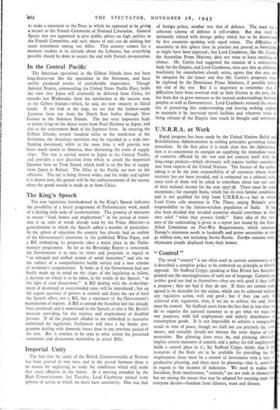Imperial Unity
The fact that thz unity of the British Commonwealth of Nations has been proved in two wars and in the period between them is no reason for neglecting to study the conditions which will make that unity effective in the future. At a meeting attended by the High Commissioners last Tuesday, Lord Cranborne named some spheres of action in which we must have unanimity. One was that
of foreign policy, another was that of defence. The need for a coherent scheme of defence is self-evident. But that itself is intimately related with foreign policy which has to be determined by five countries speaking with equal voices. The difficulties of unanimity in this sphere have in practice not proved as formidable as might have been expected ; but Lord Cranbome, like Mr. Curtin, the Australian Prime Minister, does not want to leave anything to chance. Mr. Curtin had suggested the creation of a consultative body for the Empire, and Lord Cranborne, who says that an elaborate machinery for consultation already exists, agrees that this may not be adequate for the future and that Mr. Curtin's proposals must be explored by the Dominions Prime Ministers, if possible before the end of the war. But it is important to remember that if difficulties have been resolved with so little friction in the past, that has been due in great measure to the mutual understandings between peoples as well as Governments. Lord Cranborne stressed the neces- sity of preserving this understanding and leaving nothing undone to maintain it by increased travel facilities and whatever tends to bring citizens' of the Empire into touch in thought and sentiment.


























 Previous page
Previous page